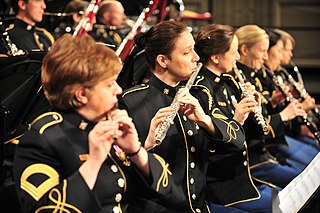Related Research Articles

A musical ensemble, also known as a music group, musical group, or a band is a group of people who perform instrumental and/or vocal music, with the ensemble typically known by a distinct name. Some music ensembles consist solely of instrumentalists, such as the jazz quartet or the orchestra. Other music ensembles consist solely of singers, such as choirs and doo-wop groups. In both popular music and classical music, there are ensembles in which both instrumentalists and singers perform, such as the rock band or the Baroque chamber group for basso continuo and one or more singers. In classical music, trios or quartets either blend the sounds of musical instrument families or group instruments from the same instrument family, such as string ensembles or wind ensembles. Some ensembles blend the sounds of a variety of instrument families, such as the orchestra, which uses a string section, brass instruments, woodwinds, and percussion instruments, or the concert band, which uses brass, woodwinds, and percussion. In jazz ensembles or combos, the instruments typically include wind instruments, one or two chordal "comping" instruments, a bass instrument, and a drummer or percussionist. Jazz ensembles may be solely instrumental, or they may consist of a group of instruments accompanying one or more singers. In rock and pop ensembles, usually called rock bands or pop bands, there are usually guitars and keyboards, one or more singers, and a rhythm section made up of a bass guitar and drum kit.

A wind quintet, also known as a woodwind quintet, is a group of five wind players.
Alvin Derald Etler was an American composer and oboist.

Brian Cherney is a Canadian composer currently residing in Montreal, Quebec.
Walter Sinclair Hartley was an American composer of contemporary classical music.
Samuel Barber's Concerto for Violoncello and Orchestra, Op. 22, completed on 27 November 1945, was the second of his three concertos. Barber was commissioned to write his cello concerto for Raya Garbousova, an expatriate Russian cellist, by Serge Koussevitzky on behalf of Garbusova and the Boston Symphony Orchestra. Funds for the commission were supplied, however, by John Nicholas Brown, an amateur cellist and a trustee of the Boston Symphony Orchestra. The score is dedicated to John and Anne Brown. Barber was still on active duty with the U. S. Army at the time he received the commission, and before beginning work asked Garbousova to play through her repertoire for him so that he could understand her particular performing style and the resources of the instrument. Garbousova premiered it with the Boston Symphony Orchestra in Symphony Hall, Boston, on 5 April 1946, followed by New York performances at the Brooklyn Academy of Music on 12 and 13 April. The concerto won Barber the New York Music Critics' Circle Award in 1947.

In music, an octet is a musical ensemble consisting of eight instruments or voices, or a musical composition written for such an ensemble.
In music, a nonet is a chamber music composition which requires nine musicians for a performance. The standard nonet scoring is for wind quintet, violin, viola, cello, and double bass, though other combinations are also found. Additionally, the term may apply to a group of nine musicians regardless of whether they are playing chamber music.
Walter Hekster was a Dutch composer, clarinetist and conductor of classical music, specialising in contemporary classical music.
Island Prelude is a chamber work composed by Joan Tower in 1988. Intended for oboist Peter Bowman of the Saint Louis Symphony Orchestra, it is originally scored for solo oboe and string orchestra.
Gary Alan Kulesha is a Canadian composer, pianist, conductor, and educator. Since 1995, he has been Composer Advisor to the Toronto Symphony Orchestra. He has been Composer-in-Residence with the Kitchener-Waterloo Symphony (1988–1992) and the Canadian Opera Company (1993–1995). He was awarded the National Arts Centre Orchestra Composer Award in 2002.
In music, a decet—sometimes dectet, decimet, decimette, or even tentet—is a composition that requires ten musicians for a performance, or a musical group that consists of ten people. The corresponding German word is Dezett, the French is dixtuor. Unlike some other musical ensembles such as the string quartet, there is no established or standard set of instruments in a decet.
Roger John Goeb was an American composer.
François-René Gebauer was a French composer, professor, and bassoonist and the son of a German military musician. He had four brothers, Michel-Joseph Gebauer (1763–1812), Pierre-Paul Gebauer, Jean-Luc Gebauer, and Étienne-François Gebauer, all of whom were also musicians and composers. The brothers played together in a quintet that was modeled on woodwind quintet instrumentation but modified by removing the flute parts to include their brother Jean-Luc, who was a percussionist. The quintet received favorable reviews from critics, who found the music to be "unusually lively for a wind quintet" and "full of earthly elegance".

The woodwind section, which consists of woodwind instruments, is one of the main sections of an orchestra or concert band. Woodwind sections contain instruments given Hornbostel-Sachs classifications of 421 and 422, but exclude 423

A woodwind quartet is a musical ensemble for four woodwind instruments. Alternatively the term refers to music composed for this ensemble. The most common scoring is flute, oboe, clarinet and bassoon. The ensemble is also often used as a teaching ensemble in schools and universities and as a concertino group in a concerto grosso.
Francis Poulenc's Sextuor (Sextet), FP 100, is a chamber music piece written for a standard wind quintet and piano. Estimates about the time of its composition range from between 1931 and 1932 and 1932 alone. It received its debut in 1933 but was later revised in 1939. Performed in its entirety, the three-movement piece lasts approximately 18 minutes.

The Quinteto is a chamber-music composition by the Brazilian composer Heitor Villa-Lobos, written in 1928. Originally scored for five woodwind instruments, it is most often performed in an arrangement for the conventional wind quintet of flute, oboe, clarinet, horn, and bassoon. A performance lasts about eleven minutes.
Alberto (Albert) Luconi was an Italian-American clarinetist and instructor.

A reed trio, also known as a trio d’anches, is a mixed chamber ensemble consisting of three reed instruments: oboe, clarinet and bassoon. Either term can also refer to a musical composition for this ensemble.
References
- Wentzel, Wayne C. Samuel Barber: A Guide to Research. Routledge. New York, New York 2001.
- Los Angeles Philharmonics